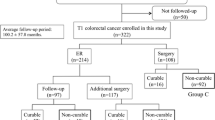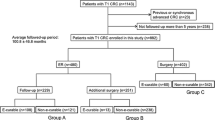Abstract
Background
The risk for lymph node metastasis and the prognostic significance of pedunculated-type T1 colorectal carcinomas (CRCs) require further study. We aimed to assess the validity of the 2014 Japanese Society for Cancer of the Colon and Rectum (JSCCR) guidelines based on long-term outcomes of pedunculated-type T1 CRCs.
Methods
In this multicenter retrospective cohort study, we examined 176 patients who underwent resection endoscopically or surgically at 14 institutions between January 1990 and December 2010. Patients meeting the JSCCR curative criteria were defined as “endoscopically curable (e-curable)” and those who did not were “non-e-curable”. We evaluated the prognosis of 116 patients (58 e-curable, 58 non-e-curable) who were observed for >5 years after treatment.
Results
Overall incidence of lymph node metastasis was 5 % (4/81; 95 % confidence interval 1.4–12 %: three cases of submucosal invasion depth ≥1000 μm [stalk invasion] and lymphatic invasion, one case of head invasion and budding grade 2/3). There was no local or metastatic recurrence in the e-curable patients, but six of them died of another cause (observation period, 80 months). There was no local recurrence in the non-e-curable patients; however, distant metastasis was observed in one patient. Death due to the primary disease was not observed in non-e-curable patients, but six of them died of another cause (observation period, 72 months).
Conclusions
Our data support the validity of the JSCCR curative criteria for pedunculated-type T1 CRCs. Endoscopic resection cannot be considered curative for pedunculated-type T1 CRC with head invasion alone.


Similar content being viewed by others
References
Muto T, Oya M. Recent advances in diagnosis and treatment of colorectal T1 carcinoma. Dis Colon Rectum. 2003;46:S89–93.
Kyzer S, Begin LR, Gordon PH, et al. The care of patients with colorectal polyps that contain invasive adenocarcinoma: endoscopic polypectomy or colectomy? Cancer. 1992;70:2044–50.
Asayama N, Oka S, Tanaka S, et al. Endoscopic submucosal dissection as total excisional biopsy for clinical T1 colorectal carcinoma. Digestion. 2015;27:216–22.
Tanaka S, Yokota T, Saito D, et al. Clinicopathologic features of early rectal carcinoma and indications for endoscopic treatment. Dis Colon Rectum. 1995;38:959–63.
Tanaka S, Haruma K, Teixeira CR, et al. Endoscopic treatment of submucosal invasive colorectal carcinoma with special reference to risk factors for lymph node metastasis. J Gastroenterol. 1995;30:710–7.
Kobayashi H, Mochizuki H, Morita T, et al. Characteristics of recurrence after curative resection for T1 colorectal cancer: Japanese multicenter study. J Gastroenterol. 2011;46:203–11.
Ueno H, Mochizuki H, Hashiguchi Y, et al. Risk factors for an adverse outcome in early invasive colorectal carcinoma. Gastroenterology. 2004;127:385–94.
Nakadoi K, Tanaka S, Kanao H, et al. Management of T1 colorectal carcinoma with special reference to criteria for curative endoscopic resection. J Gastroenterol Hepatol. 2012;27:1057–62.
Shatney CH, Lober PH, Gilbertson V, et al. Management of focally malignant pedunculated adenomatous colorectal polyps. Dis Colon Rectum. 1976;19:334–41.
Wolff WI, Shinya H. Definitive treatment of “malignant” polyps of the colon. Ann Surg. 1975;182:516–25.
Kodaira S, Teramoto T, Ono S, et al. Lymph node metastases from carcinomas developing in pedunculated and semipedunculated colorectal adenomas. Aust N Z J Surg. 1981;51:429–33.
Pines A, Bat L, Shemesh E, et al. Invasive colorectal adenomas: surgery versus colonoscopic polypectomy. J Surg Oncol. 1990;43:53–5.
Kikuchi R, Takano M, Takagi K, et al. Management of early invasive colorectal cancer. Risk of recurrence and clinical guidelines. Dis Colon Rectum. 1995;38:1286–95.
Kitajima K, Fujimori T, Fujii S, et al. Correlations between lymph node metastasis and depth of submucosal invasion in submucosal invasive colorectal carcinoma: a Japanese collaborative study. J Gastroenterol. 2004;39:534–43.
Matsuda T, Fukuzawa M, Uraoka T, et al. Risk of lymph node metastasis in patients with pedunculated type early invasive colorectal cancer: a retrospective multicenter study. Cancer Sci. 2011;102:1693–7.
Kobayashi H, Higuchi T, Uetake H, et al. Resection with en bloc removal of regional lymph node after endoscopic resection for T1 colorectal cancer. Ann Surg Oncol. 2012;19:4161–7.
Gordon MS, Cohen AM. Management of invasive carcinoma in pedunculated colorectal polyps. Oncology. 1989;3:99–104.
Colacchio TA, Forde KA, Scantlebury VP. Endoscopic polypectomy: inadequate treatment for invasive colorectal carcinoma. Ann Surg. 1981;194:704–7.
Watanabe T, Itabashi M, Shimada Y, et al. Japanese Society for Cancer of the Colon and Rectum (JSCCR) Guidelines 2014 for treatment of colorectal cancer. Int J Clin Oncol. 2015;20:207–39.
Haggitt RC, Glotzbach RE, Soffer EE, et al. Prognostic factors in colorectal carcinomas arising in adenomas: implications for lesions removed by endoscopic polypectomy. Gastroenterology. 1985;89:328–36.
Yoshii S, Nojima M, Nosho K, et al. Factors associated with risk for colorectal cancer recurrence after endoscopic resection of T1 tumors. Clin Gastroenterol Hepatol. 2014;2:292–302.
Ikematsu H, Yoda Y, Matsuda T, et al. Long-term outcomes after resection for submucosal invasive colorectal cancers. Gastroenterology. 2014;144:551–9.
Yoda Y, Ikematsu H, Matsuda T, et al. A large-scale multicenter study of long-term outcomes after endoscopic resection for submucosal invasive colorectal cancer. Endoscopy. 2013;45:718–24.
Choi DH, Sohn DK, Chang HJ, et al. Indications for subsequent surgery after endoscopic resection of submucosally invasive colorectal carcinomas: a prospective cohort study. Dis Colon Rectum. 2009;52:438–45.
Di Gregorio C, Bonetti LR, de Gaetani C, et al. Clinical outcome of low- and high-risk malignant colorectal polyps: results of a population-based study and meta-analysis of the available literature. Intern Emerg Med. 2014;9:151–60.
Tanaka S, Haruma K, Oh-e H, et al. Conditions of curability after endoscopic resection for colorectal carcinoma with submucosally massive invasion. Oncol Rep. 2000;7:783–8.
Okabe S, Shia J, Nash G, et al. Lymph node metastasis in T1 adenocarcinoma of the colon and rectum. J Gastrointest Surg. 2004;8:1032–9.
Tateishi Y, Nakanishi Y, Taniguchi H, et al. Pathological prognostic factors predicting lymph node metastasis in submucosal invasive (T1) colorectal carcinoma. Mod Pathol. 2010;23:1068–72.
Wada H, Shiozawa M, Katayama K, et al. Systematic review and meta-analysis of histopathological predictive factors for lymph node metastasis in T1 colorectal cancer. J Gastroenterol. 2015;50:727–34.
Nivatvongs S, Goldberg SM. Management of patients who have polyps containing invasive carcinoma removed via colonoscope. Dis Colon Rectum. 1978;21:8–11.
Colacchio TA, Forde KA, Scantlebury VP. Endoscopic polypectomy: inadequate treatment for invasive colorectal carcinoma. Ann Surg. 1981;194:704–7.
Cooper HS. Surgical pathology of endoscopically removed malignant polyps of the colon and rectum. Am J Surg Pathol. 1983;7:613–23.
Fenoglio CM, Kaye GI, Lane N. Distribution of human colonic lymphatics in normal, hyperplastic, and adenomatous tissue. Its relationship to metastasis from small carcinomas in pedunculated adenomas, with two case reports. Gastroenterology. 1973;64:51–66.
Oka S, Tanaka S, Kanao H, et al. Mid-term prognosis after endoscopic resection for submucosal colorectal carcinoma: summary of a multicenter questionnaire survey conducted by the colorectal endoscopic resection standardization implementation working group in Japanese Society for Cancer of the Colon and Rectum. Dig Endosc. 2011;23:190–4.
Choi YS, Lee JB, Lee EJ, et al. Can endoscopic submucosal dissection technique be an alternative treatment option for a difficult giant (≥30 mm) pedunculated colorectal polyp? Dis Colon Rectum. 2013;56:660–6.
Author information
Authors and Affiliations
Corresponding author
Ethics declarations
Conflict of interest
The authors declare that they have no conflicts of interest.
Rights and permissions
About this article
Cite this article
Asayama, N., Oka, S., Tanaka, S. et al. Long-term outcomes after treatment for pedunculated-type T1 colorectal carcinoma: a multicenter retrospective cohort study. J Gastroenterol 51, 702–710 (2016). https://doi.org/10.1007/s00535-015-1144-2
Received:
Accepted:
Published:
Issue Date:
DOI: https://doi.org/10.1007/s00535-015-1144-2




